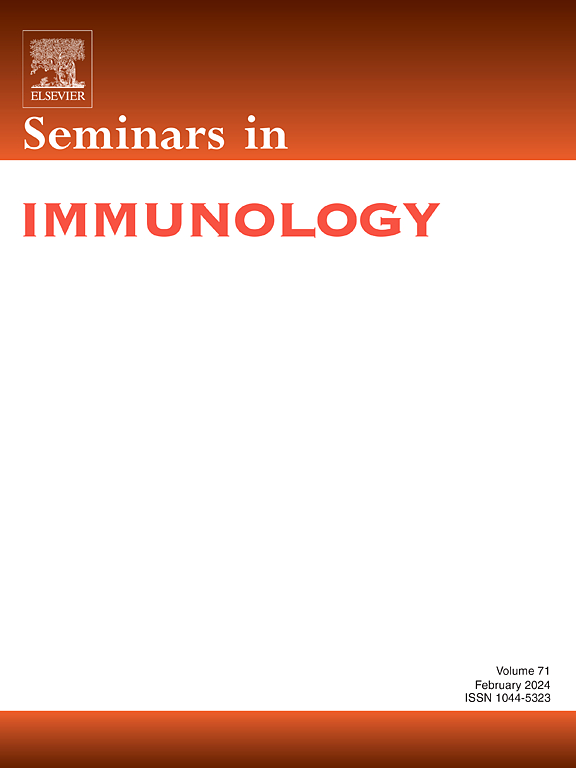Variable domain glycosylation as a marker and modulator of immune responses: Insights into autoimmunity and B-cell malignancies
IF 7.4
2区 医学
Q1 IMMUNOLOGY
引用次数: 0
Abstract
Glycosylation of antibodies is essential for shaping immune responses, as it contributes significantly to antibody function and diversity. While immunoglobulin G (IgG) Fc glycosylation is well-characterized, variable domain glycosylation (VDG) introduces an additional and less understood layer of complexity. Notably, VDG is associated with rheumatoid arthritis, where disease-specific IgG autoantibodies abundantly express this modification. Moreover, its presence on these antibodies correlates with disease progression in at-risk individuals and therapeutic outcomes. Emerging evidence links increased VDG levels to other autoimmune diseases and B-cell malignancies, highlighting its potential as both a marker and modulator in disease onset and progression. Importantly, VDG on IgG is now recognized to influence antigen binding, enhance antibody stability, and modulate interactions with the human neonatal Fc receptor. In addition, glycans in the antigen-binding domains of autoreactive B-cell receptors (BCRs) can significantly impact B cell activation. In follicular lymphoma and other B-cell malignancies, the presence of N-glycosylation sites in the immunoglobulin variable domains leads to the introduction of oligomannose glycans, which are postulated to bind to mannose-specific lectins. This interaction might promote antigen-independent activation of BCRs, thereby supporting malignant B cell survival and proliferation. Here, we explore the regulatory pathways of VDG and its functional roles across both physiological and pathological conditions, underscoring its prevalence and significance in various autoimmune diseases and B-cell malignancies. Ultimately, advancing our understanding of the regulatory factors influencing VDG and its functional implications could be highly rewarding for identifying potential therapeutic targets and strategies to prevent and treat autoimmune diseases and B-cell malignancies.
可变结构域糖基化作为免疫反应的标志物和调节剂:对自身免疫和b细胞恶性肿瘤的见解
抗体的糖基化对形成免疫反应至关重要,因为它对抗体的功能和多样性有重要贡献。虽然免疫球蛋白G (IgG) Fc糖基化已被很好地表征,但可变结构域糖基化(VDG)引入了一个额外的、鲜为人知的复杂性层。值得注意的是,VDG与类风湿关节炎相关,其中疾病特异性IgG自身抗体大量表达这种修饰。此外,它在这些抗体上的存在与高危个体的疾病进展和治疗结果相关。新出现的证据表明VDG水平升高与其他自身免疫性疾病和b细胞恶性肿瘤有关,突出了其作为疾病发生和进展的标志物和调节剂的潜力。重要的是,IgG上的VDG现在被认为影响抗原结合,增强抗体稳定性,并调节与人类新生儿Fc受体的相互作用。此外,自身反应性B细胞受体(bcr)抗原结合域的聚糖可以显著影响B细胞的活化。在滤泡性淋巴瘤和其他b细胞恶性肿瘤中,免疫球蛋白可变结构域中n -糖基化位点的存在导致低甘露糖聚糖的引入,这些低甘露糖聚糖被认为与甘露糖特异性凝集素结合。这种相互作用可能促进bcr的抗原非依赖性激活,从而支持恶性B细胞的存活和增殖。在这里,我们探讨VDG的调控途径及其在生理和病理条件下的功能作用,强调其在各种自身免疫性疾病和b细胞恶性肿瘤中的患病率和意义。最终,推进我们对影响VDG的调节因子及其功能意义的理解,可能对确定预防和治疗自身免疫性疾病和b细胞恶性肿瘤的潜在治疗靶点和策略具有很高的回报。
本文章由计算机程序翻译,如有差异,请以英文原文为准。
求助全文
约1分钟内获得全文
求助全文
来源期刊

Seminars in Immunology
医学-免疫学
CiteScore
11.40
自引率
1.30%
发文量
50
审稿时长
89 days
期刊介绍:
Seminars in Immunology is a specialized review journal that serves as a valuable resource for scientists in the field of immunology. The journal's approach is thematic, with each issue dedicated to a specific topic of significant interest to immunologists. It covers a wide range of research areas, from the molecular and cellular foundations of the immune response to the potential for its manipulation, highlighting recent advancements in these areas.
Each thematic issue is curated by a guest editor, who is recognized as an expert in the field internationally. The content of each issue typically includes six to eight authoritative invited reviews, which delve into various aspects of the chosen topic. The goal of these reviews is to provide a comprehensive, coherent, and engaging overview of the subject matter, ensuring that the information is presented in a timely manner to maintain its relevance.
The journal's commitment to quality and timeliness is further supported by its inclusion in the Scopus database, which is a leading abstract and citation database of peer-reviewed literature. Being indexed in Scopus helps to ensure that the journal's content is accessible to a broad audience of researchers and professionals in immunology and related fields.
 求助内容:
求助内容: 应助结果提醒方式:
应助结果提醒方式:


